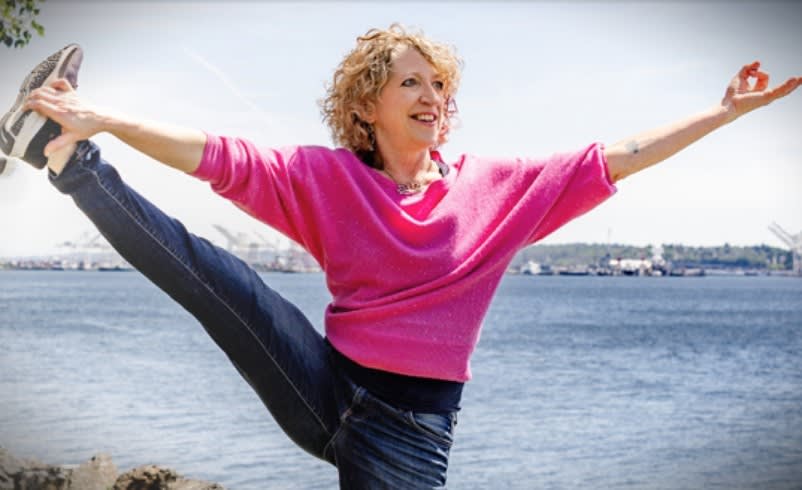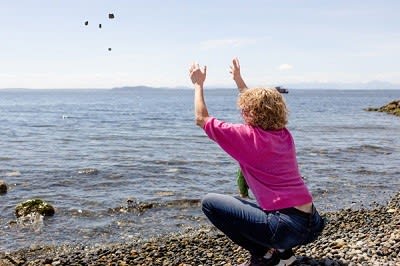
[5 min read]
In this article:
- Not wanting to burden others, Sarah Greene was determined to handle her endometrial cancer treatment and recovery privately.
- A heart-to-heart talk with a close friend convinced Sarah to accept help from loved ones and share her story.
- Art therapy through the Swedish Cancer Institute's rehabilitation medicine program has supported Sarah's emotional well-being and helped her process the difficult emotions that come up druing cancer treatment.
- Grateful for the care and compassion she has recieved at Providence Swedish, Sarah generously supports the Swedish Foundation and endometrial cancer research.
Good luck trying to sideline Sarah Greene. If she’s not doing yoga, (shown in photo above) then she’s likely partaking in dance fitness, playing volleyball, or weightlifting. There’s more, but you probably get the idea.
“Staying physically active, after family, is super important to me,” Greene says.
But in June of 2022, Greene, a Seattle-based health care research consultant, noticed she didn’t have the boundless energy she typically had.
“I had this weird kind of bloating and cramps and just wasn’t feeling like my GI (gastrointestinal) was in great shape,” Greene says. “I had abnormal bleeding and low-energy days. I’d be on the couch for hours with a heating pad.”
Greene initially thought the symptoms were tied to the transition to menopause. But when her symptoms didn't subside, Greene knew she needed to talk to her doctor.
“I went in to Swedish and was like, ‘Help me,’” Greene says.
When Greene arrived at Swedish, her primary care doctor, Emma Swingle, M.D., listened to her symptoms and, after an exam, gave her a referral for an ultrasound. She was later scheduled for a hysterectomy.
Greene had surgery on a Friday afternoon. She was told it would likely take two to three hours. Five and a half hours later, she was wheeled into the recovery room. Still in a fog, Greene was told the news: She had endometrial cancer.
“I remember Dr. Fernanda Musa holding my hand, telling me I had cancer. I don’t remember saying this, but Dr. Musa said I said, ‘I knew it.’ I just had a feeling,” Greene says.
Initially, and understandably, Greene had no interest in sharing her cancer news with the world.
“I’m notoriously private about everything. This was taking that privacy to another level. I didn’t want to burden other people,” she says.
One day after dance class, though, one of Greene’s close friends took her hand and the two talked.
“She just exudes this calming, supportive presence,” Greene notes. “She told me, ‘Why won’t you share this and let us help you? You don’t have to go through this alone.’ That was very liberating. Why should I do it alone?”
“My emotional well-being was beginning to take a hit. I think I was really starting to make sense of how much cancer sucks.”
- Providence Swedish Cancer Institute patient Sarah Greene
Sharing her story, Greene says, was cathartic in a sense. Her friend was right. She wasn’t alone.
In March of 2023, after completing chemotherapy and while she was transitioning to immunotherapy, Greene met with Aliea Hebert, M.D., MPH, who is the medical director of cancer rehabilitation medicine at the Swedish Cancer Institute (SCI), and the entire ACTIVE cancer rehabilitation team.
In June of 2023, Greene initiated the emotional well-being work by tapping into the supportive care programs Swedish has to offer. She chose art therapy because she wanted to process some of the body image and self-trust issues that had emerged.
“My emotional well-being was beginning to take a hit. I think I was really starting to make sense of how much cancer sucks,” Greene says.
Greene received a media box from Swedish, which contained colored pencils, modeling clay, watercolor brushes, and other items. Her art therapy sessions were conducted on Zoom by Kim McAndrews, MA, ATR, LMHC.
For someone who hadn’t dabbled much in art, this exercise sparked something inside Greene. Her work didn’t include grandiose paintings, but that wasn’t the point of art therapy. It wasn’t what she created, but more how the experience made her feel.
“I’m not going to be so dramatic to say it saved my life, but it was a game-changer. It was very tactical, straight forward. The breathing techniques and visualization. It helped me process everything,” Greene says.
One of the art therapy–driven exercises suggested that Greene take a backpack of rocks — with each rock representing something inappropriate said to her after her cancer diagnosis — and toss them into Puget Sound. The exercise was largely intended to be metaphorical.

Sarah Greene, a patient at the Swedish Cancer Institute, tossing rocks into Puget Sound. The exercise was recommeded by SCI therapists to help Sarah process feelings caused by others' insensitivity during her cancer treatment.
Instead, Greene went to Myrtle Edwards Park and tossed each rock in the water.
"How long are you going to live? That was one rock," says Sarah. "I know someone who had cancer, and she died in three months. There went another rock."
“I think the notion of having all these wraparound services as part of cancer care here was such a godsend. It was the best, bad experience I could imagine,” Greene adds. “I am grateful there’s a commitment to leading-edge therapies here. There are ways to combat the emotional wallop.”
Greene returns to SCI every three weeks for immunotherapy treatment. From someone once reluctant to share her cancer diagnosis, Greene has become an advocate for gynecologic cancers and supports research on endometrial cancer.
“Sarah has been able to be an amazing contributor. She’s advancing the field, she’s coming to the scientific meetings, she’s meeting people across Swedish Foundation. Sarah has found a calling to change. She’s very inspiring,” says Dr. Musa.
“Dr. Musa is the most incredible person in the world to me. Really, everyone at the front desk, the nurses, the residents, the anesthesiologist, were as amazing as you could expect when you are in this terrifying situation that you’ve never been in before,” Greene says, smiling. “They didn’t just care for my cancer. They cared for me as a person.”
Learn more and find a physician or advanced care practitioner (ACP)
The multidisciplinary team at the Swedish Cancer Institute offers inclusive care that provides advanced treatment and compassionate support to meet your needs during a challenging time. To learn more, visit our website. You can also call 1-855-XCANCER (1-855-922-6237) to talk to someone or make an appointment.
Whether you require an in-person visit or want to consult a doctor virtually, you have options. Contact Swedish Primary Care to schedule an appointment with a primary care provider. You can also connect virtually with your provider to review your symptoms, provide instruction and follow up as needed. And with Swedish ExpressCare Virtual you can receive treatment in minutes for common conditions such as colds, flu, urinary tract infections and more. You can use our provider directory to find a specialist or primary care physician near you.
About the Swedish Foundation
Your generous gift helps support a healthy tomorrow for everyone in every communty we serve. Learn about more ways to give to the Swedish Foundation or make a direct donation online at swedishfoundation.org. You can also contact the Foundation at 206-368-2738 or email foundation@swedish.org. Thank you for helping us shape the future of healthcare. We can’t do it without you.
Information for patients and visitors
Related resources
For one patient, Providence Swedish's advanced cardiac care felt like magic
After a family's heartbreaking loss, a special gift for caregivers
Cancer does not care about the electric bill
Understanding prostate cancer: risks, symptoms and prevention
This information is not intended as a substitute for professional medical care. Always follow your health care professional’s instructions.
Providence Swedish experts in the media
Follow us on Facebook, Instagram and X.
About the Author
More Content by Swedish Cancer Team























